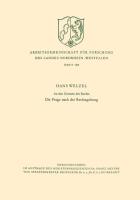An den Grenzen des Rechts
BücherAngebote / Angebote:
The lecture not only deals with the positive or de facto validity (the "effectiveness") but, also, with the normative, ob liga tory validity of right (its "legitimacy"). For the definition of positive validity, he refers to the "theories of recognizance" originating from the 19th century whereby, how ever, he divorces the general theory of recognizance prevailingly adopted today from the older, "individual", theories of recognizance. Utilizing the decisive factor of recognizance, he separates the positive validity of the legal right from the mere enforcement (in the sense of the theory of constraint). The second part of the lecture deals with the question if and under what prerequisites an actual existing positive right is also allocated a normative obligatory power ("normative" validity). He demonstrates the necessity of such a question on the "nihilism of va lues" of extremist sociological trends. Realistically and gradually he unfolds the problem by the course the "dualism of is and should be" by Kelsen on one hand and Rickert, Max Weber, Radbruch on the other, took, and which lead, with their trains of thought in agreement, to the forfeiture of the "should be" to the "is" of the existing de facto power at the times. In doing so, they destroyed the prere quisites from which they themselves started off, not only as practical-acting but, also, as theoretical-thinking men, in one and the same breath.
Folgt in ca. 5 Arbeitstagen

